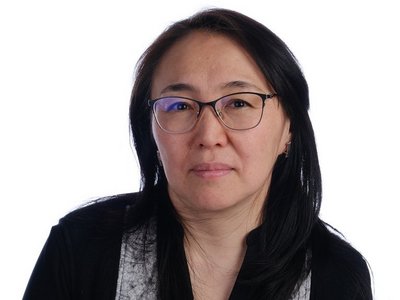

Ainura Nazarkulova is Senior Scientist at the Department of Geoinformatics - Z_GIS, University of Salzburg. Since 2013, she has been working and living in Austria with her two children. Her work is focused on managing education and research cooperation primarily in the Central Asia / Caucasus / Russia regions. This includes the selection and supervision of mobility students, contributions to the organization of conferences and the implementation of short intensive programs along with the development and maintenance of the associated websites.
To allow mobility students (and faculty) access to learning opportunities before (and after) stays in Salzburg as well as earning the credits required by learning agreements, her teaching is focussed on the organization of courses based on Massive Open Online Courses (MOOCs) and other online platforms (e.g. Esri Academy). In addition, she co-teaches elective courses like ‘Selected Topics in Geoinformatics’ and since 2021 an Erasmus+ Blended Intensive Program (BIP) on ‘Digital Earth Citizens’.
Since March 2022, she is coordinating the APPEAR project Digitally Connecting Real and Virtual Environments (DEvision) with partners from Armenia and the Kyrgyz Republic. After earlier experience with Tempus and Erasmus (e.g. CBHE) projects, this is first time that she is coordinating an international project, and of course there are some challenges. One important and maybe the most challenging tasks is to motivate partner faculty from a distance, as of course they are facing many other issues and responsibilities.
Ainura Nazarkulova’s main motivation is to bring the benefit of new technologies and new approaches to education to the partner regions, which is one of her driving forces. Geographic Information Technologies and Geoinformatics have been developing rapidly over the past decades. Geographic Information Systems (GIS), spatial data and methods are used in different disciplines and facilitate new insights and views to traditional approaches, making decisions in personal life, business and administration easier and hopefully also better. She thus wants to support more and more people to use this opportunity to learn and apply the knowledge in his or her own field of study or work.
DEvision therefore is an initiative aiming at the integration of geospatial online and blended learning modules into curricula of multiple subjects. DEvision aims at bringing 'Digital Earth' competences into an array of disciplines and is not primarily focused on 'core' geospatial study programs like Geoinformatics, Geodesy/Surveying or Cartography. It implements digital transformation concepts in societies, economies and environments by addressing students and in-service professionals through subjects sharing a spatial perspective: planning and conservation, logistics and ecology, tourism and agriculture. All these and more are inherently spatially organized, therefore benefit from an explicit spatial approach, and require inclusion of geospatial awareness and methods in their curricula.
In 2007, after completing her PhD at University of Salzburg, financed by the Austrian Development Cooperation (ADC), Ainura Nazarkulova had returned home and started to work in the Department of Geodesy and Geoinformatics at the Kyrgyz State University of Construction, Transport and Architecture (KSUCTA, now I. Razzakov Kyrgyz State Technical University - KSTU) as senior lecturer. During the first two years of her work at this university three important things happened in her life.
First of all, ACA*GIScience, the Austria - Central Asia Centre for GIScience was founded at KSUCTA by Prof. Josef Strobl (Geoinformatics, University of Salzburg), Prof. Akymbek Abdykalykov (Rector of KSUCTA), Prof. Brigitte Winklehner (President of the Eurasia-Pacific Uninet-EPU) and inaugurated by the then Austrian Ambassador, Her Excellency Ursula Fahringer. This centre became the focal point for GI professionals in the region and was supported by the Eurasia-Pacific Uninet (EPU) through scholarships, travel and research stipends. The Eurasia-Pacific Uninet was established in 2000 with the objective of creating an educational network for Austrian universities, universities of applied sciences and educational institutions in Central Asia, East Asia and the Pacific area.
The second key event was the introduction of the UNIGIS distance learning program at ACA*GIScience, and the first cohort of UNIGIS Central Asia students starting their online programme, with four of them benefitting from an EPU scholarship. Ainura served as UNIGIS coordinator for Central Asia with a hub at KSUCTA and as instructor of UNIGIS modules along with other three colleagues.
The third event was very personal and caused many changes in her personal life; she became mother of two wonderful children, which was really her dream. It meant that she had to reduce her work activities and focus more on family issues, but still over the next three years she could contribute to interesting projects and tasks through a project on Small Hydropower Potential in the Pamir-Alai Mountains, as a GIS Consultant for the Rural Development Fund, the Tien Shan Ecosystem Development Project and Avalanche Protection Forests in Kyrgyzstan – before moving to Austria in 2013.
Her PhD studies in Austria were interesting and challenging at times and full of new experiences. She especially would like to mention Annemarie Eder from the OeAD Regional Office Salzburg, as she was making their life as foreign students easy by helping and really taking care of them. Her support was so important and valuable as the students all had different cultural backgrounds. Actually, Ainura still sees her as role model: “I try my best to follow her example when working with ‘my’ incoming mobility students. Of course, during my period of doctoral studies support from everyone at the department was very important. I still had gaps in my knowledge, and as back then only PhD classes were in English, I was taking additional classes from MSc level and was allowed to present my work in English even when the class was offered in my still ‘developing’ German language.” She concludes that she is grateful for all the opportunities offered to her, and hopes to contribute to current and future students’ lives and careers in a similar way.
